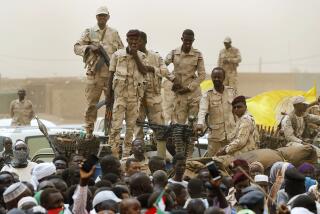A strategy for Sudan
- Share via
President Obama’s Sudan strategy, announced this week, is consistent with his approach to foreign policy elsewhere: Engage, don’t isolate. Hold out carrots, but hang on to the sticks. And, quite often, seek the middle ground.
Obama offered direct talks on nuclear weapons to the notorious leaders of North Korea and Iran, and he made it clear he wanted to meet with the Communist bosses in Beijing before receiving their Tibetan human rights nemesis, the Dalai Lama, in the White House. Now the administration has raised the possibility of peace dividends for Sudanese President Omar Hassan Ahmed Bashir, who has been indicted by the International Criminal Court on charges of war crimes in the country’s western Darfur region. This page supports the broad policy of engagement in the belief that it is more effective than isolation and confrontation for achieving U.S. goals. Although Obama’s overtures have yet to yield results on most fronts, these are early days.
The administration says it will use a mix of “incentives and pressure” to ensure that the Khartoum government denies a haven to terrorists, implements a 2005 deal to end a decades-old civil war in the south and seeks peace in the conflict in Darfur, where more than 300,000 people have died since 2003 and another 2.7 million have been driven from their homes. The wholesale rape and slaughter of civilians by government-backed militia and rebels have ceased, but Secretary of State Hillary Rodham Clinton spoke in the present tense of “the genocide that’s taking place in Darfur.” Civilians still fall victim to combat and systematic abuse. The displaced cannot return home, and Sudan does not allow international aid groups unfettered access to provide the basics for survival -- food and water.
Clinton and U.N. Ambassador Susan E. Rice, the architect of the Sudan policy, said Khartoum’s peacemaking efforts would be evaluated every three months. This is important to ensure that talks do not turn into dithering or appeasement. They did not elaborate on benchmarks for measuring progress, although the policy states that “accountability for genocide and atrocities is necessary for reconciliation and lasting peace,” and Clinton said they expect a “credible” referendum on independence under the Comprehensive Peace Agreement to end the war in the south.
U.S. officials are not to deal directly with Bashir -- still an accused war criminal, after all -- and the administration did not reveal the incentives or sanctions being considered for Sudan. But as long as the Sudanese government does not receive rewards before demonstrating verifiable advances in peacemaking, the long-awaited policy is a move in the right direction.
More to Read
Sign up for Essential California
The most important California stories and recommendations in your inbox every morning.
You may occasionally receive promotional content from the Los Angeles Times.













